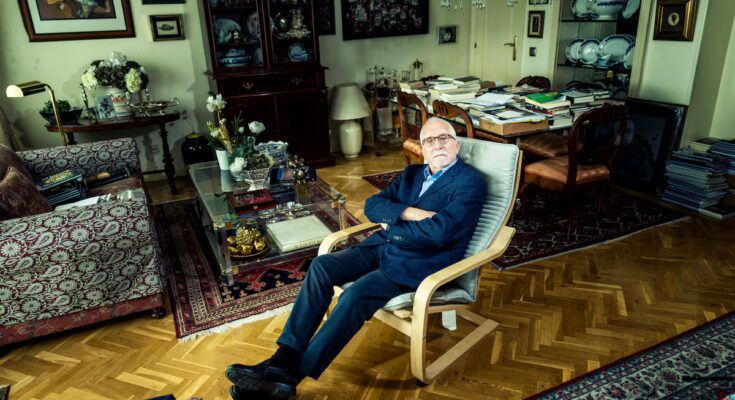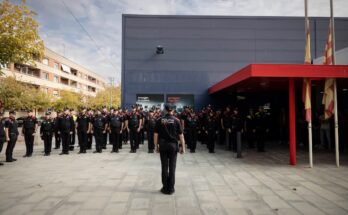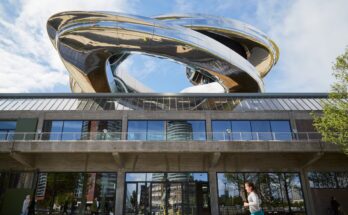“This novel does not portray a real city, but a ghost town, a metaphor for the degraded world we live in.” Luis Mateo Díez (Villablino, León, 83 years old), winner of the Cervantes Prize and narrator of imaginary worlds, speaks slowly, with the tone of someone who knows he has lived in different times. He receives guests at his home and speaks in a room where books by Roberto Arlt, Buero Vallejo, James Ellroy and Stephen King mix together. Reigning, in the center of the table, as could not be otherwise, is an enormous copy of Don Quixote. Also several copies of his latest novel, The corner keeper (Galaxia Gutenberg, 2025), a journey into the heart of a destroyed city, a parable about power and decadence and a hymn to the strange humor that still sustains men in the face of disaster. “I think it’s a funny… and disturbing book,” he smiles.
In The corner keeperthe city (and the world) has become murky, almost illegible. There is power, corruption and a ghostly city where the inhabitants seem to live between the absurd and desolation. A grotesque city, with echoes of Valle Inclán, but also of Pynchon and even of Lovecraft in its gradually deformed architecture; a city abandoned by its rulers where buildings are collapsing and the mood of the people shifts from perplexity to conspiracy and violence. The story revolves around Ciro Caviedo, a “worm” journalist, in the words of the author, lucid and ruined, who observes from the corners the spoils of power and how the city is falling into ruin. “Ciro is not corrupt, even if he lives in corruption. He is a journalist who looks from the corners of the disaster, because he knows that everything can be seen better from there”.
The author leans forward, as if measuring the weight of his words. “The city of the novel seems like a ghostly version of this world: a power that does not take care of what it should, a deteriorating democracy, sects, beliefs, brotherhoods of abandonment… They are all excrescences of the void. And the mirror is pessimistic, yes, but there is still humanity. In the midst of ruin, there are still people who resist.” The novel is written with a fragmentary rhythm, made up of rapid vignettes and verbal deliriums. “It has an accelerated, almost feverish pace. I wanted the writing to help that feeling of farce, of delirium. There are stock phrases, syntactic pauses, that language that comes from power and that contaminates everything… Power today uses a language that neutralizes our imagination”, he denounces. Díez is pessimistic, but not cynical: “We live in a world with too much current, a current that bothers us. It takes away clarity. It’s a constant noise. And in the midst of that noise, what I try with my literature is to reimagine.”
Between the city and the valley
The urban element is central to your new novel. The writer confesses his love for Madrid (“I have become very Madrilenian, I have been here since the Sixties; I worked for forty years at the Municipality and, look, now the Municipality has made me its adopted son; this, for me, was an enormous honor”, he explains), but underlines that the city of his novel does not have a real model. It is another of those Shadow Cities that populate his personal cartography, that territory of Celama linked to García Márquez’s Macondo, to the Benet Region or to Faulkner’s Yoknapatawpha. Among other things, he quotes by heart a phrase from Faulkner that is directly connected to his new work: “The corners still to be turned in a man’s destiny”. Díez laughs, with the genius of someone who still loves irony: «The protagonist, Ciro, lives like this: turning corners, looking, counting».
Then he smiles and, like someone who changes his internal landscape, remembers the valleys of his childhood. “There, in my land, there are deep roots.” When the journalist confesses the same origin, he lets his memory fly towards the towns of northern León: “Piedrasecha, Viñayo, Canales, La Magdalena – where my grandparents came from -, the Luna river… how many times I bathed in it! I spent entire summers…”, he says. “And when I return I feel a mixture of nostalgia and sadness, because the villages are almost empty. Villablino had all the terrible splendor of the mine, but now there is nothing left. The mine is no longer there, there is nothing left.”
Memory and controversy
Recently winner of the prize (in 2023), the writer last Monday decided at the Ministry of Culture to choose the new winner of the Cervantes, which ultimately fell to Gonzalo Celorio (with over an hour’s delay in the proclamation). “Celorio is a great cultural personality of the Hispanic world, and is director of the Mexican Academy. We were all aware of his value as a writer and as a person very committed to his country and to the memory, also towards our side. He has an Asturian grandfather, he has common roots with Spain… It came out this year, but I think Gonzalo would have deserved it at any time,” he says. In the midst of a diplomatic dispute between Spain and Mexico, can a figure like Celorio be a bridge between the two countries? “Maybe because of my personal roots, because of my family history of immigration to Mexico, I have a very intense connection to the country. Then, I don’t know, the history that they have, looking back at all of that, well, it’s a look of wounded memory,” she explains. “But I think the matter is completely resolved. I mean, it seems like a totally absurd resource. I don’t understand asking for forgiveness at this point, so many centuries have passed and we’re on to something else.”
It is not the only recent controversy surrounding Leonese, member of the RAE since 2001 (occupies the presidency of the capital): he also contemplated the clash between the RAE and the director of the Cervantes Institute, which, he says, “we have lived with a lot of indignation because, beyond what he said, Luis (García Montero) decides to say it before starting the Congress (of the Language Academies, in Arequipa). Which is a very important moment and very “Well planned. There were great arguments, but, even though I wasn’t present, everyone says there was no congress; only this dispute was discussed.”
He returns to his latest work and his voice then fades a little, as if he were speaking from inside his own novel: “When I go out into the street I see a desolate world, but with a vitality that keeps hope alive. The guardian at the corners – that journalist who observes – sees a disconsolating panorama, but continues to look. And this, I believe, is also the function of the writer: to continue to look, even if the world collapses”.



